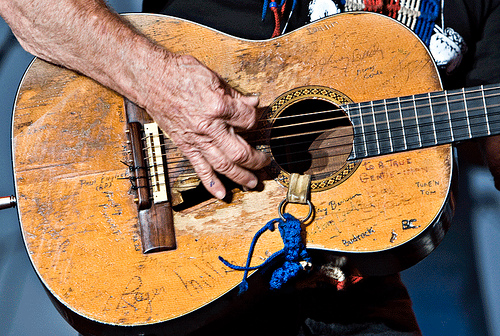It’s official – I’ve got World Cup Fever. Rampant, rabid, rousing, rampaging World Cup Fever. After America’s stunning upset tie with England yesterday, I’ve re-thought my stubborn, quasi-xenophobic aversion to what the rest of the civilized world calls The Beautiful Game. I’ve reconsidered my country’s immature obsession with winning, and learned to relish coming up even against a superior opponent. Never would I have imagined that a West Ham goalkeeper’s Bill Buckner impersonation could deliver the same shot of adrenaline as Montana to Clark, or Will Clark taking the Cubs and Mitch “Wild Thing” Williams up the middle to win the NL Pennant. After decades of watching the occasional Telemundo game with peaked curiosity or passing a British pub on vacation and noting dozens of red faced, pint-swilling enthusiasts glued to the telly, it’s finally all come together. This is what I’ve been missing all these years.
Or maybe not.
I did watch the game, still in my underwear and sipping a Coors Light in my Brooklyn apartment at 3:30 in the afternoon. I wanted to care – I really did. This patronizing “they’re really coming along” attitude that the Europeans take toward America is admittedly annoying. Listening to the English football commentator Martin Taylor repeatedly point out that his team had given away “one of the softest goals you’ll ever see at this level of play” and calling Clint Dempsey, the American who scored, “the lucky man” should have been enough to raise my ire. But it wasn’t. I, like millions of my oblivious countrymen, simply don’t give a shit. It was obvious in the remote television shots of the two teams’ respective fans – the English packed hundreds deep in some public square cheering the big screen enthusiastically at every touch. The Americans watched with stools to spare at Dempsey’s Pub in NYC’s East Village, some wearing goofy over-sized Uncle Sam top hats, but most wondering whether the Yankee game would still be on when this thing was over. What’s with us, anyway? Perhaps I can be of mild service in offering a few possible explanations.
First off, we have far too many choices to start embracing soccer. Maybe if our only diversion from televised darts, snooker, and an increasing cloud cover was this game, then we’d get riled up enough to go marauding three towns over to a rival watering hole and glass up some unsuspecting old lady for wearing the wrong colors. But our thugs carry guns over here, so most of us are inclined to save the bus fare. As for international play, how could we possibly get as worked up as England or France does facing Germany? We’ve either kicked or saved the ass of most places over there and in the process adopted indifference as a defining character trait. Besides, outside of about twelve minutes of post 9-11 good will, everybody hates us. Even the British, who applauded our ‘maturity’ in electing Obama after eight years of Bush now hate the guy for targeting BP and threatening their economy in the process. We have no friends and are happily oblivious.
More to the point, the game just doesn’t work for us. Besides the aforementioned commonplace tie score outcome, there’s the practice of settling things with a “shootout” when it really matters. No self-respecting American sport (outside of the much maligned ice hockey) would consider such an unsatisfying conclusion. It would be as if baseball went without extra innings and had a home run contest instead. It reduces a skillful match played on a wide open field to a game of pinball and, outside of the lineup of guys covering their nuts just in front of the goalie, removes the team element entirely. Then there’s the phantom fouls and faked injury. How many times can you watch some Frenchman hold his leg writhing in feigned agony before getting the overwhelming urge to see Ronnie Lott ring him up like it was 1940 and the Germans were calling? It’s an athletic sport, it’s a hell of a cardio-intensive sport, but it isn’t a rough sport. Just reference Zinedene Zidane’s “head butt” to the chest of an Italian player in the ’06 Cup if you need proof. Even the inciting insult – something to do with the Italian calling Zidane’s mother an Algerian whore raised by poorly mannered wolves – would only draw raised eyebrows over here. But really, if you want to know the simple answer to this ongoing confusion over why America doesn’t embrace soccer, it can be explained in one sentence. It doesn’t lend itself to commercial television.



